
SRHS
Steamboat Rock Historical Society
THE 1880’S IMMIGRATION AND OUTLAWS
IMMIGRATION STORIES (Part V)
“In 1876 I remember one day in early summer Father and Paul (who was now 21) were coming up the path from the field, each with a hoe. They were arguing about something and Father struck Paul across the shoulders with the hoe handle. It broke. I imagine it was rotten. That sounds like a cruel blow, but Father was so impulsive and quick tempered. Paul hastened into the house and gathered up the few clothes he had, tied them in a bundle, said goodbye to Mother and went away. Of course Mother was broken hearted and I remember Father petting and comforting her.”
“We didn’t hear from Paul for a year or more, but learned from friends at Steamboat Rock that he had gone to Denver, Colorado with some men who were going to the mining country to make their fortunes. Later, we heard from him. He was a miner now and wrote about the tuffs he was associating with.”
“February 20, 1879 a little daughter was born. Father named her Hortensia Leona after his mother.”
“In December 1879 Father drove to Eldora to buy some lumber for a blackboard for the East Bend School. He took cold on the drive and in a few days was taken down with pneumonia, which developed into typhoid. On January 4, 1880 he died.”
“Our Dear little Mother, her baby a but year old, Charlie who was the oldest boy at home, 19, and a thousand dollars debt on the farm. What a dark outlook. Anna, then twenty-one was married, May 21st to Fred Granzow. Clara was married March 19th, 1882 to Will Briggs, and how we loved him. He was so good to Mother, and helped her about the farming and planting.”
“Charlie, Martha and I were left to do the farming. Emma, Amanda, Henry, and Hortensia were too small to do much.”
“When Anna was getting ready to get married, Charlie drove her to Eldora on day with old Kate and her fiery colt, Flora. Flora hitched to the light wagon. At a railroad crossing they stopped to let a long freight train go by and Flora went wild. Charlie tried his best to hold her but they got away from him and dashed into the last car of the train. Anna and Charlie had jumped out and were not hurt. Kate was killed and Flora had her head split open. I never healed and she never was much good except for a brood mare.”
“The men of Eldora made up a subscription for $100.00 so we could buy a horse, and tho’ the Railroad Company were in no way to blame I believe they gave Mother $50.00.”
“So with the help of the neighbors Mother bought a new team, but one of the horses proved to have blind staggers. Just anywhere and at any time she would fall in a faint. The other was an old nag. But some way with the assistance of friends we managed to farm it.”
“Martha at 15 had finished country school so she went to work as house maid for a banker’s family, Mr. Skerry, at Steamboat. When school commenced they persuaded her to attend school and live with them as maid.”
“I still continued in school at the East Bend country school. Martha was trying to get me to go to town, but Mother needed me at home and I stayed with her. About this time Anna wanted me to come to Hubbard and help her as she now had two babies and it was now corn husking time so I was put on the train at about 8 p.m. It was my first train ride; about 15 miles distance and we had to change trains at Gifford crossing. As we neared the crossing the train stopped and I thought I should get off, but the train started again and I hopped out of my seat, out the door and jumped. I fell and rolled down the embankment. By the time I gathered myself up some man was at my side, asked me if I was hurt and led me to the depot where the train had stopped after crossing the Northwestern tracks.”
“I wasn’t hurt but was badly shaken. Of course the train men came to me and asked if I was hurt and told me never to jump a train when it was moving. I never did again. But when the train stopped I thought sure they were going to carry me to Marshalltown. Then a kind gentleman helped me buy a ticket to Hubbard and we were on our way again.”
“Brother Fred Granzow met me and took me out to the farm. I didn’t mention the mishap, but he told Anna that a man told him about it and she asked me, and how ashamed I was.”
“Well it was a cold winter and I went out with Fred and husked corn. Some days Anna went out and I stayed with the babies. I think I never spent a harder and unhappier time. Christmas came and I went into town with Fred to the church Christmas Tree. I sat all evening expecting my name to be called for a present but not a thing did I get. After Christmas Charlie and Martha came. Martha was called to teach a school near Hubbard. The teacher had resigned and Martha tho’ only 16, was the only available person in the county for the job. I went back with Charlie and oh how happy I was to get home–twenty miles in a bob sled drawn by a team of not too good horses. It took nearly all day to market the trip and it was very cold. But we stopped at some friends’ homes along the way and made it.”
“In January, Paul came home on a visit. How happy we were to see him. But he went back to Colorado in the spring.”
“Martha came home when her school closed in the spring, I was 15 and she 17. I wrote to Paul and told him I was now 15 years old and had never had a worsted dress. He wrote me a nice letter and sent me $5.00 to buy one. The material was a wine-colored alpaca and we had Mrs. Voiles make it. It was a beautiful dress and I had my picture taken with it on. Martha borrowed it to wear when she attended her first Normal Institute at Union.”
“Addie Tracy taught our school the summer of 1882. She was such a dear girl. I worked on the farm mornings but went to school afternoons. One day I took Henry to school. He was 5 then Addie after trying to teach him his ABC’s said: “Louisa, you should teach him his ABC’s before you start him in school”. That was 60 years ago. How different now!”
“The next spring, 1883, I started to school in Steamboat Rock, and boarded at Prof. W.A. Dorans. His family was Mrs. Doran, a little daughter, and Willie, Mrs. Doran’s son by a former husband.”
So the writings of Louisa Gellhorn ended with her entering high school in Steamboat Rock. It would have been truly interesting to have known more of her life. It is known that she completed school in Steamboat and she later taught in two or more country schools in the area. She later taught in Steamboat Rock also.
Louisa Married a gentleman by the name of Chris Boylan, and moved with him to Shawnee, Oklahoma, and later to Joplin, Missouri.
When Mrs. Henry Gellhorn was left a widow in the winter of 1880, her youngest daughter Hortensia was not quite a year old.
The farm was deeply in debt but Ulrika heroically went to work and with the help of her children gradually paid the debt and brought her children up keeping them together until all were married and had homes of their own.
The last 9 years of her life, she lived with her daughter, Mrs. Clara Briggs, where she was tenderly cared for in her declining years. Her hands were always busy and her grandchildren had many gifts that she made for them. She had bore twelve children of which four died before she did; Frank and Ernest in Germany and Amanda and Hortensia from diphtheria at a young age. She had 21 grandchildren and four great grandchildren.
The neighbors were of great help to one another in this time in out history. They were of special to the Gellhorn family after Mr. Gellhorn had died. From passages written in the diary of Benjamin F. Bear in 1886, we see how much he did to help with the Gellhorn’s farm work. More importantly we see how both Ben and Sarah Bear helped with the sick young children around them that died during this time.
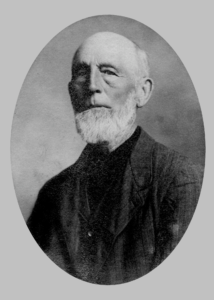
Benjamin F. Bear
April 2nd, “Went to Steamboat Rock for Ackley doctor for Gellhorns.”
April 4, “We was at Gellhorn’s last night, went back this afternoon and Hortie died at 10 minutes past 7 P.M.” April 5, “Buried Hortie this afternoon at 4 o’clock. Mandy has taken sick today.”
April 6, “Lizzie (Louisa) was taken sick last night, quite bad. We both stayed all night.”
April 7, “Lizzie and Mandy (Amanda) are some better.”
April 8, “Lizzie and Mandy are some better, but are some worse this A.M.
April 9, “Lizzie is getting better. Amanda is getting worse all the time. Me and Sari stayed all night. Sowed Gellhorn’s wheat today.”
April 10, “Lizzie is getting better. Ananda grows worse. I stayed part of last night, last part.”
April 11, “Came home in the afternoon. Ananda is still getting worse. William Briggs came today to Gellhorns.”
April 12, “I went over to Gellhorns this morning and stayed. Amanda died at 4 P.M. Buried her that evening by moonlight. Sarah came just after she died.”
April 13, “Sewing oats today. I was over to Gellhorn’s this morning to see Clara Briggs. She goes home today. Lizzie is getting better.”
April 14, “I was over to Gellhorn’s this evening. Lizzie is getting better.”
April 18, “Was over to Gellhorn’s this afternoon. They are all getting better.”
May 2, “I was to Gellhorns to meeting this afternoon.”
May 9, “Matt Miles sent for me to come. His boy has the Diphtheria very bad. Martha Gellhorn is there. Stayed all night.”
May 10, “Miles boy is worse, died 11 P.M. Stayed all night.”
May 11, “Went for a coffin for him.”
May 29, “We was to Steamboat. Stopped at Gellhorn’s”
May 31, “Martha Gellhorn came here this morning to help paper the house.”
June 1, “Martha Gell horn commenced to teach our school this morning.”
July 13, “Cut our wheat and went over to cut Gellhorn’s wheat.”
July 14, “Cut Gellhorn’s wheat today.”
July 21, “Finished oats at noon and went over to cut Gellhorn’s oats.”
July 22, “Finished their oats fore noon.”
August 9, “Went to help Gellhorn’s make hay.”
August 10, “Got hay all stacked today.”
Ulrika Gellhorn passed away at her daughter Clara’s home on July 31, 1908 at the age of 77.
Martha who was Louisa’s closest sister, married and moved with her husband Rufus Johnson, to Pasadena, California. Anna as mentioned in Louisa’s writings married Fred Granzow and lived near Hubbard, Iowa.
Only four of the Gellhorn children remained in the Steamboat Rock area; Charles, married Angie Cable. They had two children Verna (Mrs. Raymond Karsjens), Meta Mae (Mrs. Hollis Havens). Charles was a music teacher, going to the homes of his pupils to give them lessons, by horse and buggy. Later he did piano tuning in the same area.
Clara, married William Briggs, and they had one adopted daughter Bessie (Mrs. Ben Jaspers). Clara and her husband farmed in Hardin county until they retired in Steamboat Rock, and spent their remaining years there.
Emma, married Andrew Bear. Their children were Leslie, Esther Jackson, Clara Green, and Sarah Miller. Emma and her husband were farmers living in Eldora and later in Steamboat Rock.
Henry, married Mary Ott. Their children were Ernest and Sevilla Wooten. Henry purchased the home farm, and operated one of the first auto dealerships in Steamboat Rock. He retired in Steamboat Rock and passed away in 1965.
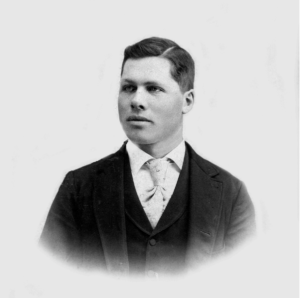
Henry Gellhorn, Jr.
Many who immigrated from Germany arrived after the railroad was in place. It can be debated if it was the railroad that brought the German Immigrant, or if it was the influence that the railroad had on farming that spawned their arrival. A great number after all were farmers, and farming really came into its own with the railroads ability to expand the farmers marketplace.
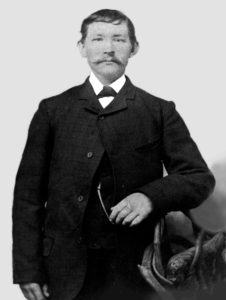
Harm Folkerts
Harm Folkerts came in 1884, and was followed by his brother George Folkerts in 1885, and both farmed. Two other brother and two sisters came as well, and most took up farming.
Barend J. Eilers, came first with his wife Frederika, and two young sons. He came to America in the midst of the Civil War. He was a shoemaker by trade, and settled first in New York, then Forreston, Illinois, then in Iowa and Steamboat Rock, in the 1890’s, where he continued his trade.
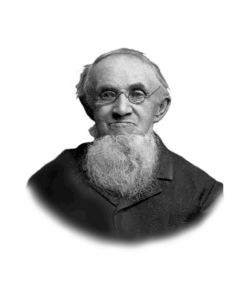
Barend J. Eilers
The Eilers and Folkerts families were very typical of the German Immigrant. Many came and settled elsewhere first, and practiced a trade. A greater number came directly to Steamboat Rock and took up farming.
Another hard working family that came to Steamboat Rock, are represented by the Ruppelt brothers who arrived in the community in the late 1880’s. Many descendants of the family remain in the area today.
Philip Ruppelt was the first to arrive, coming from Emden, Germany in 1886. He started a tinning business peddling his wares with horse and wagon. The products included all sizes of pails for all purposes, milk cans, milk strainers, wash boilers, quart measures, and water dippers.
He remained in business for only a short time before he pulled up stakes and located in Reinbeck. Sometime later he returned to Steamboat and again opened a shop this time with his brother, Herman, They carried on their trade for a time and later Philip worked as a tinner for John and Henry Cramer.
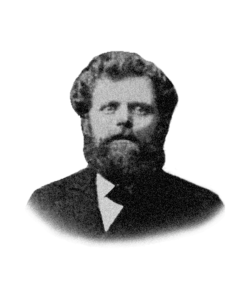
Gustave (Herman) Ruppelt
Mr. and Mrs. Gustave H. (Herman) Ruppelt arrived in Steamboat Rock in June of 1889, also coming from Emden, Germany. They crossed the Atlantic in 15 days on the ship Dresden, and came to Steamboat Rock via Baltimore on an immigration train. They had six children, Tom, Fern, Dena, Edith, Herman, and Philip.
Four more children; Edward, Ernest, Richard and Carl Ruppelt were born in Steamboat Rock.
Herman had been a master tin smith in Germany, and soon opened a tin shop in Steamboat Rock in a building on Market Street, later he moved his business to the south side of Market in a building that stood where the cheese factory would later be built.
Herman practiced his trade for eight years before purchasing an acreage southwest of Steamboat Rock on the river road. The family moved to the acreage and later purchased an additional 40 acres from Henry Lesh, descendant of one of the town’s founders.
The Ruppelt brothers, Herman and Phillip, gained a reputation of being the best sheet metal and tin workers in the area.
© 2020 Steamboat Rock Historical Society | All Rights Reserved
Powered by Hawth Productions, LLC